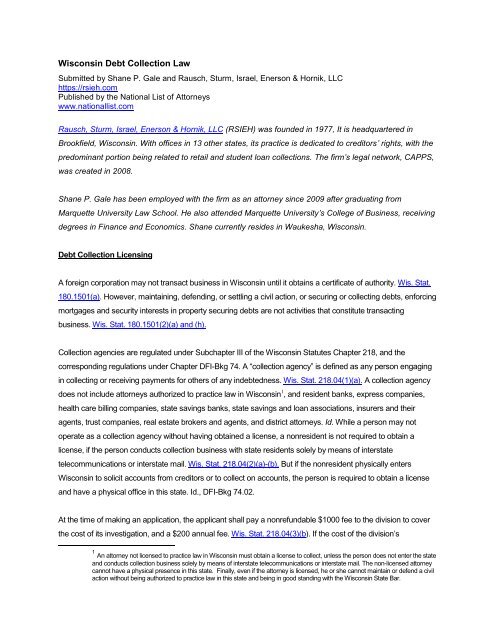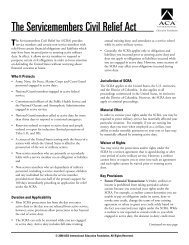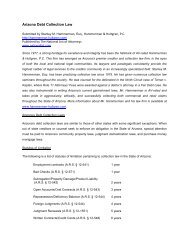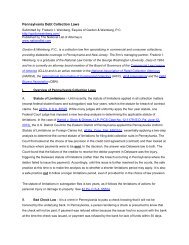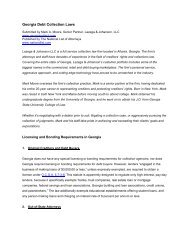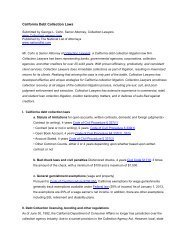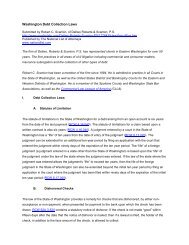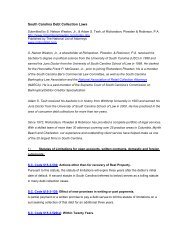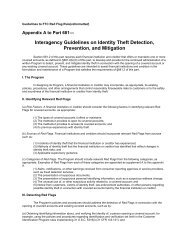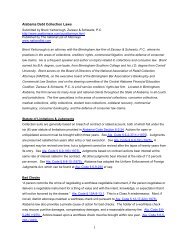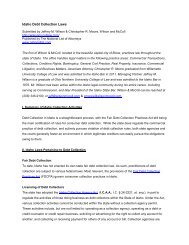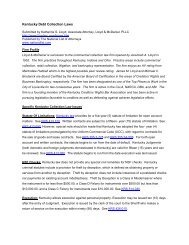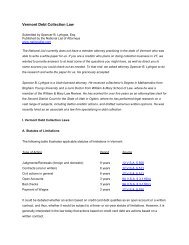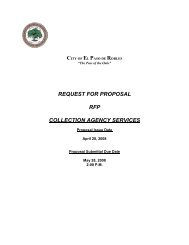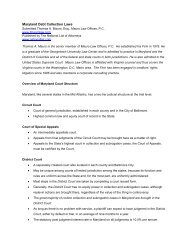Wisconsin Debt Collection Law
Wisconsin Debt Collection Law
Wisconsin Debt Collection Law
Create successful ePaper yourself
Turn your PDF publications into a flip-book with our unique Google optimized e-Paper software.
<strong>Wisconsin</strong> <strong>Debt</strong> <strong>Collection</strong> <strong>Law</strong>Submitted by Shane P. Gale and Rausch, Sturm, Israel, Enerson & Hornik, LLChttps://rsieh.comPublished by the National List of Attorneyswww.nationallist.comRausch, Sturm, Israel, Enerson & Hornik, LLC (RSIEH) was founded in 1977, It is headquartered inBrookfield, <strong>Wisconsin</strong>. With offices in 13 other states, its practice is dedicated to creditors’ rights, with thepredominant portion being related to retail and student loan collections. The firm’s legal network, CAPPS,was created in 2008.Shane P. Gale has been employed with the firm as an attorney since 2009 after graduating fromMarquette University <strong>Law</strong> School. He also attended Marquette University’s College of Business, receivingdegrees in Finance and Economics. Shane currently resides in Waukesha, <strong>Wisconsin</strong>.<strong>Debt</strong> <strong>Collection</strong> LicensingA foreign corporation may not transact business in <strong>Wisconsin</strong> until it obtains a certificate of authority. Wis. Stat.180.1501(a). However, maintaining, defending, or settling a civil action, or securing or collecting debts, enforcingmortgages and security interests in property securing debts are not activities that constitute transactingbusiness. Wis. Stat. 180.1501(2)(a) and (h).<strong>Collection</strong> agencies are regulated under Subchapter III of the <strong>Wisconsin</strong> Statutes Chapter 218, and thecorresponding regulations under Chapter DFI-Bkg 74. A “collection agency” is defined as any person engagingin collecting or receiving payments for others of any indebtedness. Wis. Stat. 218.04(1)(a). A collection agencydoes not include attorneys authorized to practice law in <strong>Wisconsin</strong> 1 , and resident banks, express companies,health care billing companies, state savings banks, state savings and loan associations, insurers and theiragents, trust companies, real estate brokers and agents, and district attorneys. Id. While a person may notoperate as a collection agency without having obtained a license, a nonresident is not required to obtain alicense, if the person conducts collection business with state residents solely by means of interstatetelecommunications or interstate mail. Wis. Stat. 218.04(2)(a)-(b). But if the nonresident physically enters<strong>Wisconsin</strong> to solicit accounts from creditors or to collect on accounts, the person is required to obtain a licenseand have a physical office in this state. Id., DFI-Bkg 74.02.At the time of making an application, the applicant shall pay a nonrefundable $1000 fee to the division to coverthe cost of its investigation, and a $200 annual fee. Wis. Stat. 218.04(3)(b). If the cost of the division’s1 An attorney not licensed to practice law in <strong>Wisconsin</strong> must obtain a license to collect, unless the person does not enter the stateand conducts collection business solely by means of interstate telecommunications or interstate mail. The non-licensed attorneycannot have a physical presence in this state. Finally, even if the attorney is licensed, he or she cannot maintain or defend a civilaction without being authorized to practice law in this state and being in good standing with the <strong>Wisconsin</strong> State Bar.
investigation exceeds the $1000 initial deposit, the applicant shall pay the excess cost upon demand of thedivision. Id. The division may also require the licensee to file and maintain a bond in an amount deemedsufficient to safeguard the interests of the public. Wis. Stat. 218.04(3)(d). The licensee shall also establish andmaintain a trust, and maintain in said account all money collected and due to any claimant or forwarder, and fileannual reports. Wis. Stat. 218.04(9g); Wis. Stat. 218.04(10), see also DFI-Bkg 74.06 and 74.12. Subchapter IIIalso provides for penalties for violating any section thereof. A person in violation shall be guilty of amisdemeanor and fined up to $1,000 or serve up to 6 months in the county jail. Wis. Stat. 218.04(12).<strong>Wisconsin</strong> Consumer ActRegardless of whether a person must obtain a collection agency license, all debt collectors must comply withthe provisions of the <strong>Wisconsin</strong> Consumer Act (“WCA”) (Chapters 421-427 of the <strong>Wisconsin</strong> Statutes). Althoughgenerally not cited as part of the WCA, the provisions of the WCA also apply to Chapter 429: Motor VehicleConsumer Leases. The Chapters relevant to debt collection are; Chapter 421: Consumer Credit – GeneralProvisions and Definitions; Chapter 422: Consumer Credit Transactions; Chapter 423: Consumer ApprovalTransactions and Other Consumer Rights; Chapter 425: Consumer Transactions – Remedies and Penalties;and Chapter 427: Consumer Transactions – <strong>Debt</strong> <strong>Collection</strong> 2 .The WCA applies to consumer transactions made in <strong>Wisconsin</strong> and to modifications including refinancings,consolidations and deferrals, made in this state, of consumer credit transactions wherever made. Wis. Stat.421.201. A consumer transaction is a transaction in which one or more of the parties is a customer for purposesof the transaction. Wis. Stat. 421.301(13). Other relevant definitions include:Consumer credit sale – a sale of goods, services, or an interest in land to a consumer on credit wherethe debt is payable in installments or a finance charge is imposed and includes any agreement in theform of a bailment of goods or lease of goods or real property, if the bailee or lessee pays or agrees topay as compensation for use a sum substantially equivalent to or in excess of the aggregate value ofthe goods or real property involved and it is agreed that the bailee or lessee will become…the owner ofthe goods or real property upon full compliance with the terms of the agreement. Wis. Stat. 421.301(9).Consumer credit transaction – a consumer transaction between a merchant and a customer in whichreal or personal property, services, or money is acquired on credit, and the customer’s obligation ispayable in installments or for which credit a finance charge is or may be imposed, whether suchtransaction is pursuant to an open-end credit plan or is a transaction involving other than open-endcredit. Wis. Stat. 421.301(10).2 Chapter 427 applies to conduct and practices in connection with the collection of obligations arising from consumer credittransaction, including transactions that are primarily for an agricultural purpose. Wis. Stat. 427.102. A creditor collecting its owndebt is subject to Chapter 427, whereas it is not subject to the FDCPA. See Wis. Stat. 427.104 for a list of prohibited practices.2
Creditor – a merchant who regularly engages in consumer credit transactions or in arranging for theextension of consumer credit or by procuring consumer credit from third parties. Wis. Stat. 421.301(16). Customer - a person (other than an organization) who seeks or acquires real or personal property,services, money or credit for personal, family or household purposes (or for agricultural purposes underChapter 427 only) and the same is used 50 percent or more for one or more of these purposes. Wis.Stat. 421.301(17). Merchant – a person who regularly engages in consumer credit transactions or in arranging for theextension of consumer credit or by procuring consumer credit from third parties. Wis. Stat. 421.301(25).While the definitions and territorial reach of the WCA are quite broad, the WCA does provide several exclusions– notably consumer credit transactions in which the amount financed exceeds $25,000 and transactionssecured by a first lien real estate mortgage or equivalent security interest. Wis. Stat. 421.201(6) and (7).Under 425.308, a customer who prevails in an action arising from a consumer credit transaction may recoverattorneys fees. But the award of attorneys fees is limited by Wis. Stat. 814.045(2).By statute, the WCA is to be liberally construed and applied to promote its purpose and policies. Wis.Stat. 421.102(1) and (2). And its remedies are to liberally administered. Wis. Stat. 425.301(1). There arelimits, however. A person who violates the WCA will not be liable for penalties provided in sections425.302(1)(a), 425.303(1), 425.304(1), or 425.305(1) if the person can show beyond a preponderance ofthe evidence that the violation was unintentional and resulted from a bona fide error. Wis. Stat.425.301(3). Liability under the WCA is also in lieu of and not in addition to liability under federal consumerprotection act, and if there are multiple obligors, there may be no more than one recovery of civil penaltiesfor each violation. Wis. Stat. 425.301(4) and (5).Costs and FeesThe costs and fees associated with engaging the <strong>Wisconsin</strong> courts are provided in Chapter 814 (foreclosuresare addressed in Chapter 846). In an action for the recovery of money, the clerk of court shall charge the partypaying the fee a court support service charge (CSS) in the amount of $51 for claims under $10,000, and $169for claims over $10,000. Wis. Stat. 815.85(1). The clerk shall also charge a justice information surcharge(JINFO) of $21.50 ($25.00 in Milwaukee County) in nearly all actions. Wis. Stat. 814.86(1) and (1m). EffectiveJuly 1, 2011, the relevant costs and fees, inclusive of the CSS and JINFO, are as follows: Filing a civil action : $269.00 Milwaukee County (Wis. Stat. 814.61(1)): $265.50 in all other counties (Wis. Stat. 814.61(1)) Personal service : $45.00-$120.00 Publication (civil) : $85.00-$300.00 Publication (small claims) : $20.00-$100.00 Jury fee : $36.00-$72.00 ($6/juror) (Wis. Stat. 814.61(4))3
Filing a small claims action : $98.00 Milwaukee County (Wis. Stat. 814.62(3)): $94.50 in all other counties (Wis. Stat. 814.62(3)) Service by mail (small claims) : $2.00 (Wis. Stat. 814.62(4) Demand for jury trial : $89.00 (Wis. Stat. 814.62(3) and 814.61(4) Docketing : $5.00 (Wis. Stat. 814.61(5)) Garnishment (civil) : $210.50 (Wis. Stat. 814.62(1)) Garnishment (small claims) : $92.50 (Wis. Stat. 814.62(1)) Filing a foreign judgment : $15.00 (Wis. Stat. 814.61(6) and 806.24) Transcription of judgment : $5.00 (Wis. Stat. 814.61(5)Limitations on ActionsA creditor or assignee thereof, seeking to collect a debt in <strong>Wisconsin</strong>, can generally initiate suit within 6years from the date the cause of action accrues. Limitations on actions are addresses in Chapter 893 ofthe <strong>Wisconsin</strong> Statutes, and are as follows: Confirmation of Arbitration Award: 1 year (Wis. Stat. 788.09) Bank deposits and <strong>Collection</strong>s: 3 years (Wis. Stat 404.111) Auto lease deficiencies: 4 years (Wis. Stat. 411.506) Action on contract: 6 years (Wis. Stat. 893.43) Auto loan deficiencies: 6 years (Wis. Stat. 893.43) Action on contract for sale: 6 years (Wis. Stat. 402.725) Action to recovery personal property: 6 years (Wis. Stat. 893.35 and 893.51) Action on a judgment of courtnot of record: 6 years (Wis. Stat. 893.42) Personal actions on any contractnot limited by Ch. 893 or anyother law of the State: 10 years (Wis. Stat. 893.50) Action on a judgment or decreecourt of record: 20 years (Wis. Stat. 893.40) Negotiable instruments: Varies (Wis. Stat 403.118)Pursuant to Wis. Stat. 893.05, the expiration of the statute of limitations eliminates the creditor’s right tocollect on the debt as well as any available legal remedies. Attempting to collect on a time barred debt willmost likely be a violation of the <strong>Wisconsin</strong> Consumer Act.After determining the cause of action, the inquiry necessarily shifts to establishing when the cause ofaction accrued. Actions on a judgment accrue on the date the judgment or decree is entered, regardlessof whether it is a domestic or foreign judgment. Wis. Stat. 893.40. An action upon an open account isdeemed to have accrued at the time of the last item proved on the account. Wis. Stat. 893.64. A partialpayment made before the statute of limitations expires tolls the statute and sets it running from the date ofthe payment. St. Mary’s Hospital Medical Center v. Tarkenton, 103 Wis.2d 422, 309 N.W.2d 14 (Ct. App.1981).In <strong>Wisconsin</strong> it is well settled that when a debtor makes a payment on a credit card, the payment not only tollsthe statute of limitations, but also sets it running anew from the date on which the payment was made. It is4
equally settled that funds do not need to be transferred. All that is required is that the payment be accepted andnegotiated by the creditor or real party in interest. Therefore, if the debtor makes a partial payment on the debt,the creditor does not lose the right to pursue the outstanding, unpaid balance.In Liberty Credit Services the Court of Appeals held that a partial payment on a contractual obligation madebefore the statute of limitations has run tolls the statute and sets it running from the date of payment. LibertyCredit Services, Inc. v. Quinn, 276 Wis.2d 826, 830, 688 N.W.2d 768, 770 (Wis.App., 2004). 3 The courtreasoned that a payment on a contract claim extends the statute of limitations to encourage settlementagreements without litigation. Id. at 831. The court also addressed payments made outside the original statutoryperiod and held that “periodic partial payments on a debt may be made beyond the ordinary statutory limitationperiod without the creditor losing the right to pursue the unpaid balance.” Id. The court concluded that apayment is not conditioned on the actual transfer of funds, but upon the recipient’s action of negotiating theinstrument. Id. at 831. “It is not necessary for the funds to have actually transferred…to constitute payment….[A] subsequent cancellation does not detract from the fact that a payment was made...” Id. The test in <strong>Wisconsin</strong>is not whether funds were transferred to satisfy a debt, either in part or in whole, but whether the debtortendered and the creditor negotiated the payment in good faith. Under this reasoning, even a bad (bounced orworthless) check will set the statute running anew.Worthless ChecksIn addition to facing criminal penalties, an adult or emancipated minor who issues a worthless check may alsobe subject to civil liability. Wis. Stat. 943.24, Wis. Stat. 943.245. A person who issues a worthless check notmore than $2,500 is guilty of a Class A misdemeanor. Wis. Stat. 943.24(1). And a person who issues a singleworthless check in excess of $2,500 or who issues any number of checks totaling in excess of $2,500 within a90 day period is guilty of a Class I felony. Wis. Stat. 943.24(2). However, a conviction under 943.25 is not acondition precedent to obtaining a judgment under 943.245. Wis. Stat. 943.245(5).If the person seeking to collect under 943.245 proves beyond a preponderance of the evidence that thedefendant issued a check in violation of 943.24 and should have known or recklessly disregarded the fact thatthe check was drawn on an account that did not exist, was drawn on an account with insufficient funds, or wasotherwise worthless, the plaintiff is entitled to the following: the face value of the check, actual damages notcovered under 943.245(1)(a), exemplary damages not more than 3 times the value of the check and actualdamages, and the actual cost of filing the action plus attorney fees. Wis. Stat. 943.245(1m), (2) and (5).However, the amount awarded for exemplary damages and attorney fees may not exceed $500. Wis. Stat.943.245(3).3 See also; Schneider v. Anderson, 227 Wis. 212, 278 N.W. 460 (1938) (interest payment on note starts new six year period beginning on firstday of last payment); Meyer v. Selover, 225 Wis. 389, 273 N.W. 544 (1937) (payment on open account served to keep account open andenforceable through 18 year period which elapsed).5
Before filing an action under 943.245, the plaintiff must give 20 days’ written notice to the defendant. Wis. Stat.943.245(4). If the defendant pays the check in full before the 20 days expires then he or she is not liable Id. Aplaintiff acting in good faith, who commences an action to collect a worthless check, is protected from criminalpenalties for threatening to accuse another of a crime under 943.30. Finally, nothing in 943.245 prevents aplaintiff from bringing the action in small claims court (see Chapter 799), provided that the jurisdictional limits aremet. Wis. Stat. 943.245(8).ReplevinReplevins are generally governed by Chapter 810 of the <strong>Wisconsin</strong> Statutes, unless the collateral securing theobligation arise from a consumer credit transaction. If the property is not abandoned 4 or voluntarily surrendered 5by the debtor, a creditor can elect one of three ways to enforce its security interests in collateral: non-judicialenforcement (self help), a replevin judgment, or a combination judgment. All are controlled by Chapter 425,Subchapter II (Enforcement of Security Interests in Collateral). Non-judicial enforcement is permitted under Wis.Stat. 425.205(1g), but that section carries specific notice requirements and is further limited by Wis. Stat.425.206. The combination judgment, like non-judicial enforcement, is also rarely used. Under Wis. Stat.425.203(2), the judgment may provide for the right to possession of the collateral and for a deficiency. However,no deficiency shall be sought where the deficiency is less that $1,000. Wis. Stat. 425.209(2).The most common method of securing the creditor’s rights in the collateral is through a replevin judgment.Under Wis. Stat. 425.206, no merchant may take possession of collateral or goods subject to a consumer leaseother than by exercise of legal process; subject to the exceptions previously mentioned. This applies even if thedebtor takes the collateral and moves to another state (First <strong>Wisconsin</strong> Nat’l. Bank v. Nicolau, 113 Wis. 2d 524,335 N.W.2d 390 (1983)), or if the contract was entered into in another state by a <strong>Wisconsin</strong> resident or thedebtor later becomes a resident at the time of default. Walser Leasing, Inc. v. Simonson, 120 Wis.2d 458, 355N.W.2d 545 (Wis. App. 1984).Pursuant to Wis. Stat. 425.205, replevin actions are conducted under the small claims rules and proceduresprescribed by Chapter 799 of the <strong>Wisconsin</strong> Statutes, regardless of the value of the collateral. The replevinjudgment only determines the right to possession of the collateral. Wis. Stat. 425.205(1)(e). A deficiencyjudgment is not waived, but simply sought in a separate action. Id. Once the creditor has obtained its replevinjudgment and takes steps to repossess the collateral, the creditor cannot commit a beach of the peace or enterthe customer’s residence, unless at his or her request. Wis. Stat. 425.206(2). Finally, the collateral must be soldin a commercially reasonable manner. Wis. Stat. 409.610 and 409.627.4 See Wis. Stat. 425.2075 See Wis. Stat. 425.2046
Post Judgment Remedies and ExemptionsDocketing a judgment grants the creditor (thereafter judgment creditor) a lien on the debtor’s real estate in thecounty where the judgment was docketed (Wis. Stat. 806.15(1)(a)), but a creditor must take other affirmativesteps if it wants to collect the value of its judgment. The primary post judgment remedies are garnishment(Chapter 812) and execution (Chapter 815).There are 3 kinds of executions: one against the property of the judgment debtor, another against the judgmentdebtor’s person, and the 3 rd for the delivery of property belonging to the judgment debtor. Wis. Stat. 815.03. Theprocess for issuing an execution is prescribed by under Wis. Stat. 815.05, and in most instances the clerk in thecounty where the judgment was originally docketed issues the writ of execution. Wis. Stat. 815.05(1g)(a).Notably, an execution against property may only be issued in a county where the judgment is docketed. Wis.Stat. 815.07. If debtor moves to a new county, the judgment must be transcribed in that new county.A judgment creditor who wishes to execute, but has waited more than five years after the judgment is renderedmust seek leave of the court before proceeding. Wis. Stat. 815.04(1)(b). And while the ten year limit on ajudgment lien (Wis. Stat. 806.15(1)) does not apply to executions, no execution is permitted after 20 years fromthe date the judgment is rendered. Wis. Stat. 815.04(1)(c). Lastly, a judgment creditor should expect thepossibility it will have to provide security (usually in the form of a bond) to indemnify the officer levying onproperty. Wis. Stat. 815.24.Chapter 812 is separated into two parts; Subchapter I, Garnishment of Property Other than Earnings, andSubchapter II, Earnings Garnishments. Regardless of which subchapter the creditor relies on, <strong>Wisconsin</strong> courtsdo not have jurisdiction over a foreign garnishee based solely on the garnishment’s employment of the debtor.The jurisdictional (Wis. Stat. 801.05) and venue (Wis. Stat. 801.50) requirements apply to both the debtor andthe garnishee.While both pre and post judgment non-earnings garnishments are contemplated under Wis. Stat. 812.02, prejudgmentgarnishments are rare, and prohibited in consumer credit transactions. Wis. Stat. 425.111. A nonearningsgarnishment is commenced by filing a summons and complaint, and serving both the debtor and thegarnishee. Wis. Stat. 812.07(1). Because <strong>Wisconsin</strong> is a marital property state (see Chapter 799), the debtor’sspouse may also be a defendant if the property being sought is marital property. Wis. Stat. 812.01(1),812.02(2e). Under <strong>Wisconsin</strong>’s marital property laws, marital property of either spouse is available to satisfy ajudgment in a garnishment action. Wis. Stat. 812.02(1).7
Once the creditor successfully obtains an order directing the garnishee to turn over specific property or paymoney to the creditor, the garnishee become liable to the creditor for the property or funds in its possession upto the amount of the claim, less amounts exempt from execution. Wis. Stat. 812.18(1). In addition to theexemptions below, no garnishee is liable by having drawn, accepted, made, endorsed, or guaranteed anegotiable instrument; by having collected any amount through its own execution; by holding money as a pubicofficer; or by anything owed upon a contingency. Wis. Stat. 812.19(1). Furthermore, property held in a safedeposit box is not property in possession or control of the bank. Wis. Stat. 812.19(5).An earnings garnishment is an action to collect an unsatisfied civil judgment for money damages, plus statutoryinterest and costs from earnings payable by the garnishee to the debtor. Wis. Stat. 812.32. The creditor canonly commence an earnings garnishment in a county where the judgment was entered or has been transcribed.Wis. Stat. 812.31(3). An earnings garnishment lasts for a period of 13 weeks (Wis. Stat. 812.35(5)), unless theparties stipulate to an extension (Wis. Stat. 812.4), or the debtor is a state employee. The wages paid to debtorsemployed by a state or political subdivision thereof shall be garnished until the judgment is satisfied. Wis. Stat.812.42(2)(b).As an alternative to garnishment, the creditor and debtor may agree for the debtor to pay a fixed amount orpercentage of his or her wages until the judgment is paid. Wis. Stat. 241.09. A wage assignment is generallyeffective for a period not to exceed six months (Id.), but if the debt arose out of a consumer credit transaction,then the wage assignment must be terminable at will by the debtor. Wis. Stat. 422.404(1).Lastly, a garnishee who fails to pay funds over to the garnishee within the time period prescribed by Wis. Stat.812.39(1) may be held liable directly to the creditor. If payment is not made, the creditor may move the court forjudgment against the garnishee for amount of the unsatisfied judgment, plus interests and fees. Wis. Stat.812.41.Chapter 816 of the <strong>Wisconsin</strong> Statutes permits a judgment creditor to compel the debtor to answer concerninghis or her property. Wis. Stat. 816.03. A judgment debtor is also required by small claims procedure to completeand return to the creditor a financial disclosure statement. Wis. Stat. 799.26. A judgment debtor who does notappear for a supplemental exam, does not return the financial disclosure statement, or violates any other orderof the court, may be compelled by the court’s contempt powers to appear and answer. Smith v. Burns, 65Wis.2d 638, 223 N.W.2d 562 (1974). An arrest warrant under Chapter 816, however, is not an available remedyfor creditors under the <strong>Wisconsin</strong> Consumer Act. Wis. Stat. 425.113(1).Judgment debtors facing garnishment or execution are not left without protection, however. Unless a courtotherwise grants relief after a hearing on the matter, 80 percent of the debtor’s disposable income is exemptfrom an earnings garnishment under Wis. Stat. 812.30 et. seq. (discussed above). Wis. Stat. 812.34(2)(a). His8
or her earnings are totally exempt if the debtor’s household income is below the poverty guidelines (updatedannually) or the debtor receives need-based public assistance. Wis. Stat. 812.34(2)(b). In any case, thegarnishment is limited to the debtor’s income in excess of the poverty guidelines before the garnishment is ineffect. Wis. Stat. 812.34(2)(c).A debtor may also claim certain reasonable exemptions as allowed under Wis. Stat. 815.18(3). With that said, itis the debtor’s responsibility to affirmatively claim the exempt property as exempt. Wis. Stat. 815.18(6). A debtormay claim the exemption at the time of seizure or within a reasonable time thereafter, but before disposition bysale or court order. Id. A resident debtor may also exempt his or her interest in the following, where anonresident is entitled to the exemptions provided by the laws of his or her state of residence. 6 Wis. Stat.815.18(5).1. Provisions for burial of the debtor or the debtor’s family.2. Business and farm property, including equipment, inventory, farm products and professional booksused in the business of the debtor or dependant of the debtor, and not exceeding $15,000.3. Child or family support, or maintenance payments to the extent that said payments are reasonablynecessary for the support of the debtor and his or her dependants.4. Certain consumer goods not to exceed $12,000 in aggregate value.5. All sums paid as state aid under Wis. Stat. 93.23(1) to county fairs and agricultural societies.6. Federal disability and insurance benefits under 42 USC 401 to 433.7. For 2 years after the date of receipt, insurance proceeds on exempt property payable to orreceived by the debtor if the property was destroyed by fire or casualty of any nature8. All money paid or ordered to be paid to any member of any fire or police department or survivingspouse or guardian of the minor children of a deceased or retired member.9. All fire engines and equipment belonging to or which may belong to any town, city, or village in thisstate10. Life insurance and annuities owned by the debtor and insuring the debtor, debtor’s dependant, oran individual of whom the debtor is a dependant, up to $150,000. However, if the insurancecontract was issued less than 24 months before the exemption is claimed, then this subsection islimited to $4,000.11. Motor vehicles not to exceed $4,000 in aggregate value. However, any unused portion of theaggregate value under Wis. Stat. 815.18(3)(d) may be added to increase this exemption.12. 75 percent of the debtor’s net income for each one week pay period, limited to the extentreasonably necessary for the support of the debtor and the debtor’s dependants, but not less than30 times the greater of the state or federal minimum wage.13. Payments under a life insurance contract, resulting from a wrongful death or personal bodily injury,or in compensation for the loss of future earnings. Payments resulting from personal bodily injury6 A debtor may claim either the exemptions listed in Wis. Stat. 425.106 or the exemptions under Wis. Sat. 815.18(3) forobligations arising from a consumer credit transaction.9
are only exempt up to $50,000, however. Any property traceable to payments under this section isalso exempt.14. Assets held or amount payable under most retirement plans, provided that the plan or contractcomplies with the provisions of the IRS, or the plan was created for the exclusive benefit f theemployer, if self employed, or of some or all of the employees or their dependants or beneficiaries.The plan must also require the employer or employees or both the make contributions for thepurpose of making distributions, and makes it impossible for any part of the principal or income tobe diverted for any other purpose than for the exclusive benefit of the beneficiaries.15. Depository accounts in the aggregate value of $5,000, but only to the extent that the account is forthe debtor’s personal use and not a business account.16. All money received by a resident of <strong>Wisconsin</strong> on account of military or naval service as pension,compensation or government insurance, and all other money received by a person on account ofmilitary or naval service from the U.S. Government17. Tuition units purchased under Wis. Stat. 16.64.18. An interest in a college savings account under Wis. Stat. 16.641.With the exception of subsection (3)(h) (net income), each spouse is entitled to and may claim the exemptionslisted above. Wis. Stat. 815.18(8). If the exemption is limited to a specified dollar amount, each spouse isentitled to one exemption. Id. A recent amendment to the exemption statutes extended marital property rights tothe homestead exemption, and permits each spouse to claim that exemption. Wis. Stat. 815.20(1).A homestead selected by the debtor and occupied by him or her is exempt from execution, from every lien ofjudgment, and from liability for the debts of the owner to the amount of $75,000; excluding mortgages,mechanics’, laborers’ and purchase money liens, taxes and except as otherwise provided. Wis. Stat. 815.20(1).The exemption extends to the proceeds derived from the sale of the property for up to two years provided thatthey are held with the intent to acquire another homestead. Id.Furthermore, any owner of an exempt homestead against whom a judgment has been rendered, and any heir,devisee, or grantee of the owner, or any mortgagee of the homestead may seek declaratory relief if the owner ofthe judgment fails, after 10 days demand, to execute a recordable release of judgment lien. Wis. Stat.815.20(2). When the equity in the homestead exceeds the maximum exemption, the homestead is partiallyexempt, and a properly docketed judgment is a lien on the excess equity. Rumage v. Gullberg, 2000 WI 53, 235Wis. 2d 279, 611 N.W.2d 458. If the equity is less than $75,000, the homestead is fully exempt and no judgmentattaches. Id.Case <strong>Law</strong><strong>Wisconsin</strong> Consumer Act10
American Industrial Leasing Co. v. Geiger, 345 N.W.2d 527, 118 Wis.2d 140 (1984): Consumer leases aresubject to the exclusionary provision of Wis. Stat. 421.201(6). "Amount financed" means the purchase price orcash price for property leased.Bank One v. Ofojebe, 284 Wis.2d 510, 702 N.W.2d 456 (2005): Under Wis. Stat. 425.109, judgment may not beentered on a complaint that does not comply with the statute. The creditor must provide the “figures necessary”for the debtor to compute the amount owed. (Compare and contrast with Estate of Newgard and Michaud).Brunton v. Nuvell Credit Corporation, 785 N.W.2d 302, 2010 WI 50 (2010): Wis. Stat. 421.401(2)(b) states thatan improperly venued consumer credit action must be dismissed unless the defendant appears and waives theimproper venue. Appearance in the action and pleading in the action are distinct requirements. Waiver undersubsection (2) requires the intentional relinquishment of a known right. To establish a valid waiver, it must beproved that the defendant knew the place of proper venue and knew of the right to dismissal of the case when itwas not properly venued. A plaintiff must prove that the rights to proper venue and dismissal of an improperlyvenued action were intentionally relinquished. Continued litigation of an action does not unambiguouslydemonstrate an intention to relinquish the right to proper venue.Community Credit Plan, Inc. v. Johnson, 596 N.W.2d 799, 228 Wis.2d 30 (1999): Although voluntarilydismissed, prosecution of improperly venued actions violated the consumer act, and the defendants wereprevailing parties under s. 425.308 entitled to attorney fees.Credit Acceptance Corporation v. Woodard, 812 N.W.2d 525, 340 Wis.2d 548 (Ct. App., 2012): A party movingfor attorneys fees and costs under the <strong>Wisconsin</strong> Consumer Ac (WCA) must show both a significant benefit inlitigation and a violation of the WCA on the part of the non−moving party. When a claim for deficiency judgmentwas dismissed without costs and without prejudice, no violation of the WCA was shown.Dean Medical Center, S.C. v. Conners, 618 N.W.2d 194, 238 Wis.2d 636 (2000): An agreement necessary toestablish that there is an obligation "payable in installments" under Wis. Stat. 421.301(30), which is required forthere to be a "consumer credit transaction" under subsection (10), must be made before services are rendered.Permitting a debtor to pay over time only after attempts to collect in full have failed does not render thetransaction a consumer credit transaction.Estate of Newgard v. Bank of America, 735 N.W.2d 578, 2007 WI App 161, (2007): Wis. Stat. 425.109(2)requires a creditor to document any transaction it wishes to collect upon. (Compare and contrast with Ofojebeand Michaud).First <strong>Wisconsin</strong> Nat’l. Bank v. Nicolau, 113 Wis. 2d 524, 335 N.W.2d 390 (1983): WCA applied wherecontract was entered into in <strong>Wisconsin</strong>, and debtor later took collateral and moved to another state. Thebona fide error defense does not apply to mistakes of law.Footville State Bank v. Harvell, 432 N.W.2d 122, 146 Wis.2d 524 (Ct. App. 1988): a prevailing party is one whosucceeds on any significant issue and is entitled to recover fees relating to successfully litigated issues.Hartman v. Meridian Financial Services, Inc., 191 F.Supp.2d 1031 (W.D. Wis., 2002): violation of the WCA forattempting to enforce a non-existent right since the debt collection was collecting under a false name.Hollibush v. Ford Motor Company, 508 N.W.2d 449, 179 Wis.2d 799 (1993): A "breach of the peace" underWis. Stat. 425.206(2) has the same meaning as in Wis. Stat. 409.503. Repossession in disregard of thedebtor's oral protest is a breach of the peace. Punitive damages may be appropriate as the result of the breachof the peace.Homa v. East Towne Ford, Inc., 370 N.W.2d 592, 125 Wis.2d 73 (1985): the notice of right to cure default under425.104 is deemed given on the date the notice is mailed and the date of tender of performance by the debtorshall be deemed given on the date of mailing.11
Household Finance Corp. v. Kohl, 173 Wis.2d 798 (1993): Further discussion of the pleading requirements ofWis. Stat. 425.109.Indianhead Motors v. Brooks, 726 N.W.2d 352, 2006 WI App 266: Complaint dismissed for failure to give debtorthe required notice of right to cure default as required by Wis. Stat. 425.104.Kett v. Community Credit Plan, Inc., 228 Wis.2d 1, 596 N.W.2d 786 (1999): A replevin action is an attempt tocollect a debt. The lenders obtained default judgments in the wrong venue, as prescribed by Wis. Stat.421.401(1), and relied on non-judicial enforcement of their security interests to repossess the vehicles. Thejudgments were reopened as void, and the takings were found to be a violation of the WCA, Chapter 427.Mercado v. GE Money Bank, 768 N.W.2d 53, 2009 WI App 73 (2009: Even if there was a failure to comply withthe pleading requirements of this section, such a failure cannot deprive a small claims court of subject matterjurisdiction and cannot render a default judgment void.Rent-A-Center v. Hall, 510 N.W.2d 789, 181 Wis.2d 243 (1993): provides two part test to determine whether arent to own transaction is subject to the WCA.Rosendale State Bank v. Schultz, 365 N.W.2d 911, 123 Wis.2d 195 (1985): if the obligation is entirely past dueand fully owed, therefore making it impossible for the customer to restore the loan to a current status, the noticeof right to cure default under Wis. Stat. 425.104 need not be given.Rsidue, LLC v. Michaud, 2006 WI App 164 (2006): A company that purchased an overdue credit card accountand brought an action to collect the amount due on it was not a “creditor” within the meaning of Wis. Stat.421.301(16) and not subject to the pleading requirements of Wis. Stat. 425.109(1). (Compare and contrast withEstate of Newgard and Ofojebe).Smith v. Burns, 65 Wis.2d 638, 223 N.W.2d 562 (1974): Wis. Stat. 425.113 prohibits arrest warrants underChapter 273 of the <strong>Wisconsin</strong> Statutes, but does not prohibit the court from exercising its contempt powers andissuing a body attachment for the debtor.Walser Leasing, Inc. v. Simonson, 120 Wis.2d 458, 355 N.W.2d 545 (Wis. App. 1984): WCA applies where thecontract was entered into in another state by a <strong>Wisconsin</strong> resident or the debtor later becomes a resident at thetime of default.Zehetner v. Chrysler Financial Co., LLC, 679 N.W.2d 919, 272 Wis.2d 628 (2004): a customer is not limited to aperson who is liable on the debt, and may include a person who signs the application for credit.Capital One USA Bank, NA v. Summers, 2009AP1337 and 2009AP1338 (unpublished): the billing statements,and not the terms or cardmember agreement, are the “writings” contemplated under subsection (2) and providethe debtor with the figures necessary to calculate the amount owed. See, Wis. Stat. 425.109(1)(d) and (2).Other Case <strong>Law</strong>Liberty Credit Services, Inc. v. Quinn, 276 Wis.2d 826, 830, 688 N.W.2d 768, 770 (Wis.App., 2004): a paymentmade, and subsequently withdrawn, was sufficient to toll the applicable statute of limitations.Palisades <strong>Collection</strong>, LLC v. Kalal, 781 N.W.2d 503, 2010 WI App 38 (2010): provides a detailed discussion ofthe business records exception, concluding that without more, the of the assignee’s custodian of the recordsdoes not have the requisite personal knowledge to lay the foundation for the business records exception whenthe relevant documents were created by the assignor.Rumage v. Gullberg, 611 N.W.2d 458, 235 Wis. 2d 279 (2000): when equity in a homestead exceeds theexemption under Wis. Stat. 815.20, the homestead is partially exempt, and the docketed judgment is a lienupon the debtor’s excess equity. If the debtor has less than the $75,000 in equity, the homestead is fullyexempt, and the debtor has no interest to which the judgment lien may attach.12
St. Mary’s Hospital Medical Center v. Tarkenton, 103 Wis.2d 422, 309 N.W.2d 14 (Ct. App. 1981): partialpayment on a hospitalization bill starts statute running anew.Stan’s Lumber, Inc. v. Fleming, 196 Wis.2d 554, 565, 538 N.W.2d 849, 853 (Wis. App., 1995): There are atleast two ways that an account stated can arise, the retention of statements by a party without objecting within areasonable time and when a debtor makes partial payment on an account or accompanies partial payment withan agreement to pay the remaining balance.Tickanen v. Harris & Harris, Ltd., 461 F.Supp.2d 863 (7 th Cir., 2006): even though the cardholders did not signan agreement, they were bound to arbitration because both their failure to take affirmative action to not acceptand their continued use of the card constituted an acceptance of the amended terms.Waushara County v. Graf, 166 Wis. 2d 442, 452, 480 N.W. 2d 16 (1992): It is a general principal that prose litigants "must satisfy all procedural requirements" and courts are not required to cut them any slack incomplying with procedural rules.Additional Links<strong>Wisconsin</strong> Legislative Reference Bureau: click on links along the left side of the page to access the <strong>Wisconsin</strong>Statutes Annotated, Code and Register. http://legis.wisconsin.gov/lrb/<strong>Wisconsin</strong> Department of Financial Institutions: links to corporate records search, UCC filings, and banking andconsumer information. http://www.wdfi.org/<strong>Wisconsin</strong> Administrative Code – DFI-Bkg: regulations related to banking, collection agencies, and consumerlaw. http://docs.legis.wisconsin.gov/code/toc/dfi-bkgCCAP and WSCCA: Access to <strong>Wisconsin</strong> circuit, appeal and supreme court filings.http://wcca.wicourts.gov/index.xsl and http://wscca.wicourts.gov/index.xsl.<strong>Wisconsin</strong> Circuit Court Forms: http://www.wicourts.gov/forms1/index.htmPlease be advised that this is not intended as legal advice. Changes to laws, statutes, regulations andcosts can and do occur. We recommend that you contact an attorney for advice specific to your legalmatters and your state.©The National List of Attorneys, January 201313


